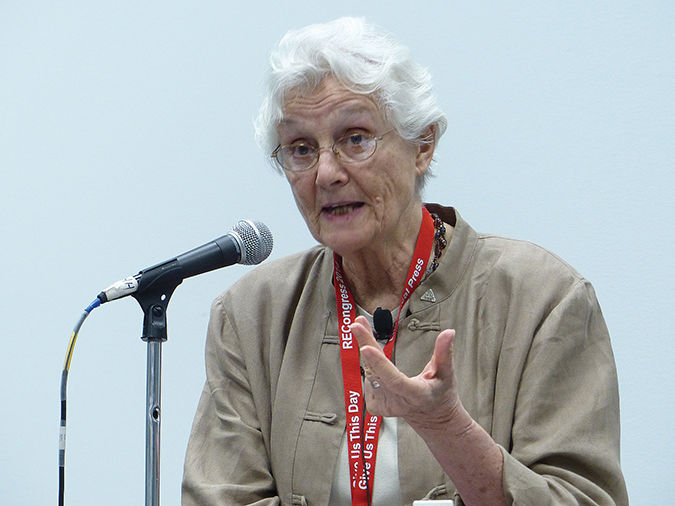Being good stewards of the earth behooves people to reflect on whether the natural world can afford a “just war,” considering the destructive power of contemporary weapons upon fragile eco-systems, according to a leading Biblical scholar.
Sister of St. Agnes Dianne Bergant, distinguished professor of Biblical Studies at Catholic Theological Union in Chicago and a former president of the Catholic Biblical Association of America, points out that the Catholic “just war” teaching formulated to address conflict is an attempt to limit, not justify, an armed confrontation that appears to be inevitable.
Sister Bergant, who spoke in March at the Religious Education Congress in Anaheim, notes that among the U.S. Catholic bishops’ criteria both for the use of force and for restraint in the midst of war is the principle of proportionality, as stated in their 1993 statement, “The Harvest of Justice Is Sown in Peace.”
“The overall destruction expected from the use of force must be outweighed by the good to be achieved,” said the bishops, adding that decisions for restraint in war should be guided by the concern “to avoid disproportionate collateral damage to civilian life and property.”
Considering the overwhelming destructiveness of today’s modern weapons, which can scorch the earth, rendering it uninhabitable for any life form, Sister Bergant says reflections on the “just war” principle of proportionality should be broadened beyond an exclusively anthropocentric or human-centered point of view to also consider war’s ecological costs.
“We must consider whether or not the massive amount of resources and energy consumed, and the enormous quantities of non-disposable toxic and radioactive wastes produced in the testing and use of weaponry justify the depletion of natural wealth and the destruction of ecosystems,” says Sister Bergant.
“No longer can we confine [proportionality’s] applicability exclusively to war’s effect on human life, culture or property,” she adds. “The principle of proportionality must now be considered within the context of the ‘integrity of creation,’ a phrase that was defined by the World Council of Churches as: ‘The value of all creatures in and for themselves, for one another, and for God, and their interconnectedness in a diverse whole that has unique value for God…’
“This interconnectedness,” Sister Bergant continues, “has led some to realize that the question forced upon us by the reality of war is not simply a matter of the value of human life. Rather, it is a matter of all life as we know it, for to disrupt our own environment is to threaten the entire ecosystem of which we are a part.”
Acknowledging that there are various views regarding the issue of biotic devastation caused by munitions — and that commitment to this cause has been criticized by various journalists, NGOs and politicians — Sister Bergant notes that a combination of global support and stringent mechanisms leading to international laws mitigating war’s environmental destruction has the potential to change the face of combat and possibly discourage opposing forces from initiating a war.
“If any of these changes are to take root, a significant shift in worldview must take place,” she states. “At the heart of this must be a radically different understanding of anthropology. We women and men must perceive ourselves as part of the earth community, not over and against it.”
She notes that the idea of human stewardship, not sovereign rule, over the earth is reflected in Leviticus 25:23: “Land shall not be sold in perpetuity, for the land is mine, and you are but aliens who have become my tenants.”
“If God is the sole owner,” says Sister Bergant, “then the only possible relationship of the people to the land is that of a steward. The steward cannot dispose of or use the land according to any whim, but must fulfill the owner’s instructions. There is no absolute right to property here. It is clear from this passage that the ecological well-being of the land was seen as intimately tied to the spiritual and material well-being of the entire people of Israel.”
Today, she noted, ecological devastation poses a tremendous challenge to all of God’s earthly creation. “Our connectedness with all of natural creation leads us to realize that we are not autonomous rulers on earth. Rather, we are representatives of God with the commission to care for God’s earth.
“Therefore,” Sister Bergant adds, “if and when we are faced with the possibility of armed conflict, we must take all of creation into our consideration of proportionality — and we must do this keeping before us the image of peace found in the message of Isaiah [65:25]: ‘The wolf and the lamb shall graze alike, and the lion shall eat hay like the ox (but the serpent’s food shall be dust). None shall hurt or destroy on all my holy mountain, says the Lord.’”

